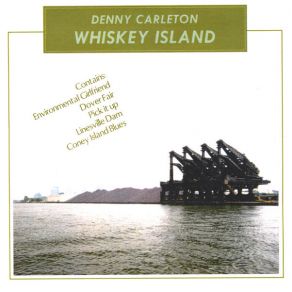Whiskey Island
Download links and information about Whiskey Island by Denny Carleton. This album was released in 1999 and it belongs to New Age, Rock, Pop, Songwriter/Lyricist genres. It contains 15 tracks with total duration of 43:15 minutes.

|
|
|---|---|
| Artist: | Denny Carleton |
| Release date: | 1999 |
| Genre: | New Age, Rock, Pop, Songwriter/Lyricist |
| Tracks: | 15 |
| Duration: | 43:15 |
| Buy it NOW at: | |
| Buy on iTunes $9.99 | |
| Buy on iTunes $9.99 | |
Tracks
[Edit]| No. | Title | Length |
|---|---|---|
| 1. | Where Are We Going? | 2:49 |
| 2. | Whiskey Island | 3:25 |
| 3. | Breathtaking | 3:10 |
| 4. | It Only Takes a Spark | 3:00 |
| 5. | Feuger Shakespeare or Mitchell | 2:27 |
| 6. | Linesville Dam | 2:45 |
| 7. | Peter On the Water | 3:46 |
| 8. | Pick It Up | 2:37 |
| 9. | Dover Fair | 3:34 |
| 10. | Environmental Girlfriend | 2:01 |
| 11. | Shades of Gray | 3:08 |
| 12. | I Could Never Dance | 3:04 |
| 13. | Coney Island | 2:55 |
| 14. | When My Ship Went Down | 2:03 |
| 15. | Further Down the Line | 2:31 |
Details
[Edit]Recorded at Carleton's eight-track home studio (with the exception of the title cut), this disc mines mostly light folk-rock territory. Carleton's compositions explore concerns about the environment, faith, broken romance, and the bewildering confusion engendered by modern times. Sometimes the record is so light that it might be more fairly categorized as folk than rock. Occasionally it's sappy (though not painfully so), and at other times it's a bit like a collection of environmentally responsible tunes that traveling troubadours might sing at school assemblies to motivate kids to be socially conscious. If that brings negative stereotypes to mind, it should also be said that Carleton is at the top of this genre (if you can call it that), and that most of the songs don't fall into that potentially odious framework at all. Carleton's voice retains its appealing, slightly vibrant, Celtic-tinged quality. His melodies are pleasant, and there are numerous odd twists in his lyrics that you won't find in those by a lot of polite, contemporary folksingers (like the mix of ecology and love in "Environmental Girlfriend"). Also, unlike a lot of folky performers in his position, Carleton resists the always ill-founded strategy of over-production in an effort to capture the adult contemporary market. There are electric instruments here, but they're played sensitively, as if they were acoustic ones; the percussion and bass are light and sympathetic. So one might ask, Why don't they play this guy on public radio broadcasts or Prairie Home Companion? Unfortunately, the answer has more to do with circumstance than talent.